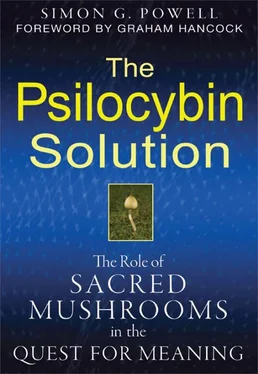And let us not forget good old water. Water is indispensable for life. The various unique physical and chemical properties of water—as utilized by life in such processes as photosynthesis, nutrient transport, osmosis, heat reduction through sweat evaporation, and so on—make water a form of fluidic information fundamental to the art of living.
Then there is DNA. Not only is it remarkable that something like the genetic code was always waiting to fall into place once certain precursor events had unfolded here on Earth, but it is equally remarkable that DNA has the specific kind of variability and mutability that it does. If it were much more subject to mutability and change, then it would not be robust enough for life to take hold; and if it were too accurate in terms of replicational fidelity, then it could not become subject to natural selection. As with many other creative properties of Nature, it seems there are specific windows of opportunity present, and it “just so happens” that DNA has all the qualities necessary for it to work.
These are but a handful of the countless examples that show how finely tuned the Universe must be to bring forth organic life. This situation echoes the precise conditions needed in the Game of Life for cellular automata to bring forth elaborately organized forms. In both cases, the real world and the model world, it is clear that specific fundamental laws in association with specific fundamental constants and precise initial conditions are needed to ensure that interesting organized patterns evolve.
Now, Wait Just a Goddamn Chronon!
We might protest here and argue that life has merely exploited the conditions that happen to prevail. In that case, life has just seized on whatever “chances” are on offer, where chances is the appropriate word. Life might therefore reflect what can be achieved in an essentially uncontrived Universe. But how can we be positive that life and consciousness could have evolved in “any old kind” of Universe? Could one just throw some dice to determine, say, the mathematical nature of the laws of physics, and then still expect to get life and consciousness at some stage in the resulting reality? Could one think of any number between 1 and 1 million, add 5, randomly shuffle the decimal point, designate this number as the value of a constant, and then still expect to come up trumps with the subsequent Universe? Come to think of it, why should there be any laws, energy, and dimensions at all?
It appears impossible to conclusively prove that an evolutionary process in which consciousness is eventually formed depends on our particular type of Universe with its particular initial conditions, physical laws, constants, and so on. And yet it is easy to imagine stupid and very silly Universes in which nothing of interest happens. Letting our imagination go, we can picture Universes in which the laws of physics stop complex structures from forming or in which the constants of Nature force the Universe to form into a bland and stagnant conglomeration in which nothing creative happens. More chaotically, we can imagine Universes with little or no law and order at all, or with just a couple of unstable dimensions. Or, even more absurdly, we can imagine a Universe in which life starts, only to be inevitably destroyed soon after by some immutable principle of physical law. There are trillions and untold zillions of possible boring lifeless Universes, just as there are billions and untold zillions of possible uncreative cellular automata. So, why is our Universe so very, very interesting? And why us?
One “fast-food” solution is to suppose that the Universe expands from a big bang only to eventually contract into a “big crunch” at some later stage. Out of a big crunch a new Universe evolves and the cycle continues, only this time the successive Universe has slightly different laws and initial conditions. This “pulsation of Universes” is presumed to have been going on forever without any reason whatsoever—an infinite chain of Universes with no end and no beginning. One of these, ours, just happens to be one of the significant ones among a literal infinity of boring ones.
A similar scenario to this is the arch-cunning multiple-Universe theory touted by a disturbing number of quantum physicists. They view the Universe dividing whenever a quantum event takes place in which more than one outcome is possible. This happens more than a lot. Thus, the Universe is forever branching into an endless amount of Universes. Again, we merely happen to be in one of the more interesting ones.
Finally, there is the “birthing Universe” theory, also of appeal to some cosmologists. This imaginatively fertile scenario views black holes giving birth to new Universes with slightly different laws and constants, one of which… well, you know the score by now.
Are the above proposals tenable in explaining our very special Universe? On reflection, these “you want it your way, you got it” schemes are a tad ridiculous, for in them there must be, by definition, not only an infinity of Universes but an infinity of ones like our own, differing perhaps only in some minor detail like, say, your surname. In one of this infinity of Universes, or perhaps in 582 of them, each of my readers will be called Mr. or Mrs. Banana. But, since we can never observe or experience these other Universes (apart from in Star Trek or The Twilight Zone ), then what on earth is the point of invoking them? In other words, is it really legitimate to speak about that which cannot in any way be verified by direct experience? I think not.
The popular principle of Occam’s Razor (perhaps we should now call it Occam’s Laser) holds that one should always stick to the simplest theory possible whenever one has to choose among competing theories. This tenet has attained a kind of hallowed status within science. If we introduce it here, we see that there could be no more blatant departure from the use of Occam’s Razor than in an inference that a literal infinity of unobservable Universes exist . And, as Davies has pointed out, even if you do endorse one of the cunning multiple-Universe scenarios, they all fail to explain why an infinite chain of Universes exists in the first place! Basically, what all of these imaginative multiple-Universe scenarios reveal is that physicists and cosmologists are in expletively deep water when it comes to accounting for the “why” of our most creative Universe. In other words, it is becoming more and more apparent that Nature is extremely fine-tuned, yet no one really wants to invoke an intelligence to account for the fine-tuning.
Alternatively, some people just shrug their shoulders at the presence of life and consciousness in the Universe, happy to heed the Beatles and just let it be, let it be. As long as dinner is on the table and there’s a good film on TV, who cares why the reality process is so organized, coherent, and conducive to consciousness? And as for agnostics who deny that people can acquire knowledge about the ultimate nature of the Universe, unless they have explored all possible approaches to the mystery, then they are merely being lethargic, happy to shrug and shrug again at unexplainable brute facts. Alas, we have no time for such shruggers here.
I happen to think that it is a bit of an intellectual cop-out to dismiss the fine-tuning of our Universe as being no more than a brute fact to be mindlessly swallowed and forgotten about. It is not just that a Universe with specific laws, dimensions, and free-flowing energy should exist in the first place (why not dimensionless nothingness—it seems a lot more simple), and it is not just that a Universe should endure for so long. Why should the something that does exist be so creative and reach a state where it can contemplate itself through the mind of Homo sapiens ? How come we ourselves are so highly attuned to the mystery?
Читать дальше










